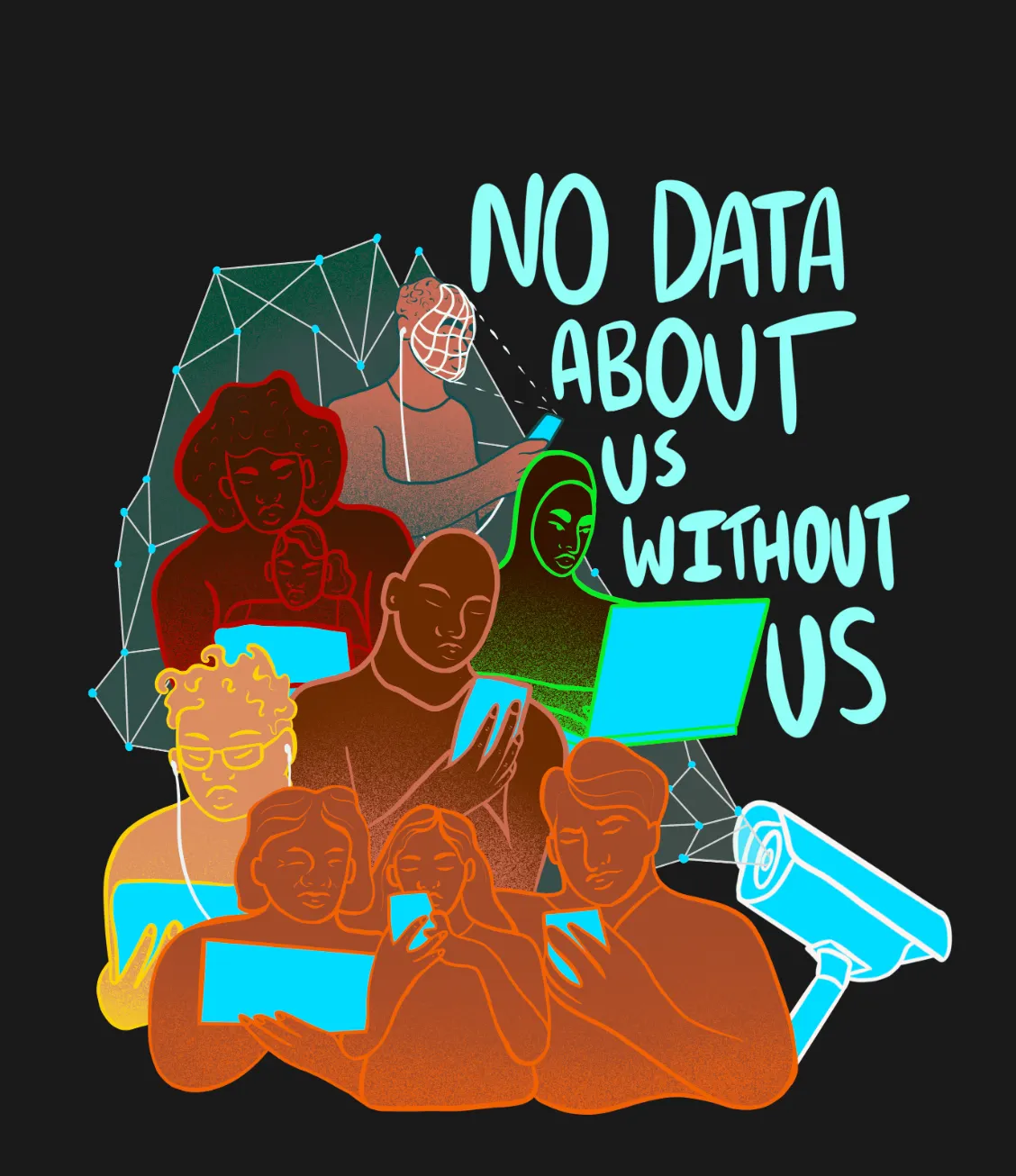Récits de surveillance
Découvrez l'expérience de Hannah Mackaness, qui a travaillé dans le secteur de la technologie publicitaire avant de collaborer avec l'Institut Edgelands. L'auteur souligne la nécessité d'éduquer le public sur les complexités de la surveillance, de la collecte de données et du ciblage à l'ère numérique.

Hannah Mackaness à l'événement "Genève à l'ère numérique : exploration des questions émergentes de la première année d'Edgelands Genève" à la Maison Rousseau présentant l'activité "Surveillance Narratives." 15 juin 2023.
Mon intérêt pour la surveillance et la sécurité est né lorsque je travaillais pour une startup de technologie publicitaire à Londres. Je travaillais sur un mécanisme d'enchères en direct pour permettre l'achat et la vente en temps réel de publicités vidéo et d'espaces pour montrer ces vidéos aux personnes qui consomment du contenu en ligne. En travaillant ici, j'ai commencé à comprendre le grand nombre d'acteurs impliqués dans un tel processus, l'ampleur des données achetées et vendues, la possibilité de cibler les publicités et l'impact de la combinaison de ces facteurs. En tant qu'entreprise, nous étions fiers d'offrir un "ciblage émotionnel" des publicités. Le service allait au-delà de la catégorisation de base du sexe, de l'âge, de la localisation et offrait la possibilité de cibler les personnes que nous considérions comme "heureuses" ou "aventureuses". C'était il y a près de dix ans - les possibilités de suivi, de reconnaissance des formes, d'enchères en direct et de surveillance ont progressé à pas de géant. Un nombre extrêmement restreint de personnes ont pris des décisions sur la manière dont cela s'est produit et des groupes encore plus restreints, composés principalement d'hommes blancs, ont construit et entretenu le code.
Lorsque j'ai parlé de mon travail à des personnes extérieures, j'ai commencé à me rendre compte que les gens n'avaient pratiquement aucune idée du fonctionnement des publicités ciblées, ni de la manière dont leurs données étaient utilisées, ni de l'échelle à laquelle elles l'étaient. À peu près à la même époque, j'ai assisté au lancement du livre de Shoshana Zuboff, The Age of Surveillance Capitalism, qui examine la manière dont les entreprises technologiques exploitent les données personnelles à des fins lucratives et remodèlent fondamentalement la société. J'ai trouvé ce livre extrêmement frustrant : il fait 704 pages, il est riche en exemples et il est totalement inaccessible aux personnes qui ne sont pas déjà très intéressées par la question de la surveillance. Dans son format, le brillant travail qu'elle avait réalisé resterait dans les cercles d'experts et d'universitaires. Il a cimenté en moi la conviction que la surveillance, la publicité, la sécurité et l'appareil d'État devraient faire davantage pour éduquer le public sur les possibilités de collecte, de stockage, de récolte, de vente et de reconnaissance des formes des données. En tant que principaux bénéficiaires de ce système, ils n'ont que peu ou pas de motivation pour partager ces informations.
Cette collaboration avec l'Institut Edgelands est une petite tentative d'intéresser un public plus large à ces questions.

Dès l'enfance et jusqu'à l'âge adulte, nous consommons des récits sur la protection, la sécurité et la prise en charge, dans lesquels des personnes physiques existent dans des lieux physiques spécifiques pour découvrir et arrêter des menaces physiques.
L'architecture physique nous est enseignée depuis l'enfance : une tour de guet, un poste de surveillance, un poste de guet, une voiture de police, un toit, etc. La technologie qui nous est présentée est couramment utilisée par une seule personne à la fois ou par un petit groupe de personnes : un bloc-notes, des jumelles, un déguisement, une écoute téléphonique. Les personnes qui effectuent ces activités sont souvent dans un rapport de 1:1 ou 1:petit groupe. En bref, l'idée dominante est que la surveillance est exercée par de petites équipes ou des individus pour mettre fin à des menaces physiques.

J'ai commencé à réfléchir à la manière dont ce récit nous a conduits à accepter largement l'argument du " rien à cacher ", qui dit en substance : "si vous n'avez rien à cacher, vous ne devriez pas avoir peur de la surveillance". Si, dans les récits culturels populaires, nous comprenions l'étendue de la surveillance, ses utilisations, ses utilisations potentielles et sa combinaison avec des technologies qui progressent rapidement, serions-nous si heureux d'accepter le statu quo ?


Étant donné que ce récit commence par des jouets destinés aux jeunes enfants, c'est là que j'ai commencé à développer des idées. Étant donné qu'une partie de la mission d'Edgelands est d'établir un dialogue en dehors des cercles d'experts, je voulais créer quelque chose qui soit immédiatement reconnaissable, spécifique à la ville de Genève et simple à utiliser. Pour s'engager pleinement, les citoyens doivent sentir qu'ils ont la possibilité de changer la façon dont les choses sont construites, conçues ou envisagées. Dans cette optique, les blocs de construction de la ville semblaient être un point de départ idéal.
J'ai choisi un style naïf pour la conception graphique, afin de faire comprendre qu'il y a une main humaine derrière toutes ces machines et ces décisions. Il était important de transmettre le message qu'il n'est pas inévitable que nos villes finissent par devenir des tours de guet pour l'État ou les citoyens privés.

Les blocs colorés et l'emballage ont été choisis de manière à donner l'impression d'un jouet pour enfants de 2023. Il ne s'agit pas d'une conception spéculative ; les éléments inclus font partie de nos vies et de nos villes actuelles.


Si nous voulons aborder les idées de sécurité et de surveillance de manière significative, ces objets doivent faire partie du récit populaire. Je voulais créer un jouet qui pourrait trôner fièrement sur les étagères de Manor, une chaîne de magasins suisse, à côté des autres jouets éducatifs en bois et des ensembles Playmobil de commissariat de police.
.jpg)

Hannah Mackaness est une designer interdisciplinaire dont la pratique se situe à l'intersection de la technologie, du féminisme et du monde naturel. Elle s'est intéressée aux technologies de surveillance après avoir travaillé dans une start-up spécialisée dans la publicité et s'être rendu compte que, de manière générale, le public comprenait très mal l'ampleur du suivi, de la surveillance, de la manipulation et de l'échange de données et d'attention en ligne.



